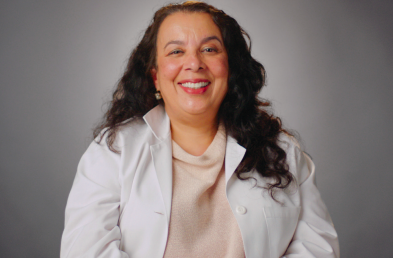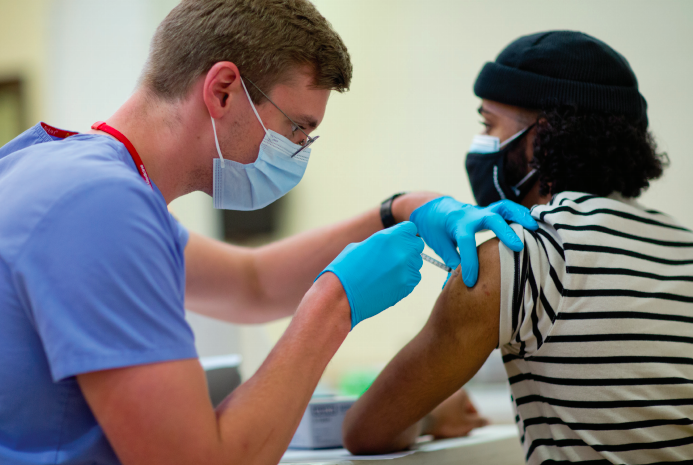With vaccine availability growing in New York City and across the country, attention is increasingly turning to those who remain hesitant to receive it. Between 70 to 90 percent of the population needs to be vaccinated in order to reach herd immunity and bring the pandemic under control, according to public health experts. Yet 14 percent of Americans say they will definitely not get a vaccine and another 13 percent want to wait and see how they work or will only get one if required, a Kaiser Family Foundation (KFF) poll found in July.
Much attention has focused on hesitancy among Black and Hispanic populations, based in part on their feelings of mistrust in the healthcare system. So diversity leaders at Weill Cornell Medicine have launched ambitious community vaccination and education efforts, with the goal of improving uptake and helping those who are reluctant overcome their concerns. The July KFF poll showed some 16 percent of Hispanic adults wanting to “wait and see” before getting vaccinated, compared to 11 percent of Black adults and 8 percent of white adults. The poll also found that resistance to vaccination is associated with younger age, lower level of education, lack of insurance coverage and political affiliation.
Healthcare professionals who work with and belong to Black and brown communities say the focus needs to be as much on making the vaccine easy to access as on hesitancy. Although anyone age 12 and up is now eligible in the U.S., getting an appointment can require Internet fluency—plus taking time off and traveling to a site.
In January, NewYork-Presbyterian opened a vaccination site at the Fort Washington Armory in Upper Manhattan, prioritizing appointments for eligible residents of Washington Heights, Inwood, Harlem and the South Bronx. Additionally, using information provided by Cornell Cooperative Extension–NYC, the Weill Cornell Medicine Clinical and Translational Science Center (CTSC) has worked with the Community Healthcare Network of federally qualified health centers to administer, as of late May, over 8,600 vaccine doses. The effort, led by Jeff Zhu of the CTSC, was conducted at sites staffed by Weill Cornell medical students in churches and nonprofit spaces in Manhattan, the Bronx and Queens. And in April, Weill Cornell Medicine’s future physicians teamed up with Hunter College nursing students to run clinics at churches in Jamaica, East New York and Harlem, with the aim of vaccinating 100,000 people by September.

Dr. Susana Morales. Credit: Kaiser Family Foundation
Dr. Julianne Imperato-McGinley, director of the CTSC and a professor of medicine, says it’s important to make vaccination available in people’s own communities, particularly at “trusted spaces” like places of worship or a neighborhood organization. The CTSC had previously worked with a predominantly Black church on a free health screening program called Heart to Heart; its pastor reached out to the center and got vaccinated himself in front of his congregants. “The point about trust is essential,” says Dr. Imperato-McGinley, also an attending physician at NewYork-Presbyterian/Weill Cornell Medical Center. “That’s why we’re doing this with faith-based communities, where the community knows the people hosting the event. And it’s working—they are getting vaccinated.”
Throughout the vaccine rollout, significant attention has also been paid to the healthcare system’s historic mistreatment of communities of color—particularly the infamous Tuskegee experiment, in which researchers withheld treatment from Black people who had syphilis so they could study the disease’s course. But it’s not just history: COVID-19 has had a disproportionate impact on people of color, some of whom remain underserved by the healthcare system. For this reason, experts say, questions about why vaccines—which usually take years to develop—could be produced so quickly, or whether they could cause future side effects, should be seen as self-advocacy rather than hesitancy.
To help healthcare professionals respond to these concerns, in March Weill Cornell Medicine trained “vaccine ambassadors” to serve as relatable, credible sources of information. “It’s not about convincing people,” says Dr. Susana Morales, an associate professor of clinical medicine and director of the Diversity Center of Excellence within the Cornell Center for Health Equity and an associate attending physician at NewYork-Presbyterian/Weill Cornell Medical Center, who spearheaded the training. “It’s about providing information that is sorely missing; it’s about empowerment and access.” At the training, supported in part by a $200,000 gift by the law firm Weil, Gotshal & Manges LLP, panelists framed conversations as filling a “knowledge gap” and advised approaching questions in a receptive and empathetic manner. “I tell patients, ‘I promise you I’ve done the research to decide whether I can recommend COVID vaccines to you—and whether I was going to accept the vaccine myself,’” said Dr. Morales, who shares with them that she has been vaccinated.
In response to concerns about the speed of vaccine development, Dr. Morales describes how clinical trials were able to enroll thousands of diverse volunteers and produce results quickly because of how widespread the virus has been. Ambassadors address questions about side effects by noting that study participants continue to be monitored for serious adverse reactions, which investigators must report and drug makers and other study sponsors must disclose. They also point out long-term side effects of COVID-19 infection such as neurological damage, against which the vaccine protects.
To patients from populations that weren’t included in vaccine studies, ambassadors can share findings from the latest research. For example, none of the currently approved vaccines have shown negative effects on fertility or caused pregnancy abnormalities in animal studies, and early data on vaccinated pregnant women is very encouraging, says panelist Dr. Kevin Holcomb, associate dean for admissions and a professor of clinical obstetrics and gynecology at Weill Cornell Medicine and an attending ob/gyn at NewYork-Presbyterian/ Weill Cornell Medical Center. Dr. Holcomb has also talked to people about historical comparisons, when appropriate. For example, he has learned that some are under the false impression that in the Tuskegee study, researchers infected participants with syphilis—when in fact they denied them penicillin to treat the disease. Says Dr. Holcomb: “What happened in Tuskegee is what we might be doing by not availing ourselves of this vaccine.”
— Elaine Meyer
A version of this story appears in the Weill Cornell Medicine Summer 2021 issue.

